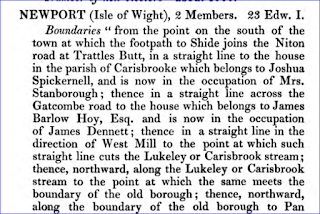Following my efforts at DPLA reported at reference 3, BH turned up references 1 and 2, happening to have copies to hand, and came up with a good part of the story.
Not to be outdone, I went back to DPLA and took a more careful look at the copy of the act provided by the book, the title page of which is snapped above. The one thoughtfully provided by the University of Wisconsin.
With section (or is it chapter?) XVI of the act summarising the new deal for the Isle of Wight: there was to be just one member, down from the six they had had before.
It seems that the two member constituencies of Newport and Yarmouth had been restored and that that of Newtown had been created by Elizabeth I. The first of which was consolidated into the one member constituency for the island as a whole and the last two of which were abolished in 1832. Brading does not get a look in: it must have come and gone before the invention of Parliaments.
There then follows lots of good stuff about eligibility to vote, with eligibility hanging on the minutiae of landholding and taxpaying, lots of good stuff about the registration of voters and about the conduct of elections. Samples of the forms to be used therein by the servants of local government.
At some point, someone thinking it necessary to write down the boundaries of Newport, snapped above. In which I think that '23 Edw. I' means as enacted by Edward I in the 23rd year of his reign. Or is it the 23rd of his acts?
From all of which I take away the thought that the Reform Act of 1832 is not that unlike a modern bit of consolidating legislation, but a good deal more legible & accessible, and its study in the raw - rather than from a helpful one page summary from the BBC website or from Wikipedia - would make a fine project for students of what used to be called A level history. All sorts of instructive stuff about the mechanics of legislation, representation and elections. All fine background to how such things ought to be done now.
PS: one remaining worry: the act only seems to have addressed the problems of England and Wales, these last at some length. What about those other parts of the kingdom, Scotland and Ireland? Had their representation been sorted out de novo at the time of their unions and so did not need remedial work at this time? All the chiefs, clans, septs, tanists and tacksmen had already been swept away?
Reference 1: Isle of Wight: the complete guide - Brinton - 2006.
Reference 2: The Isle of Wight: an illustrated history - Mr. & Mrs. Jones - 1987.
Reference 3: https://psmv3.blogspot.com/2018/07/carex-deceased.html.
Reference 4: https://en.wikipedia.org/wiki/Reform_Act_1832.



No comments:
Post a Comment